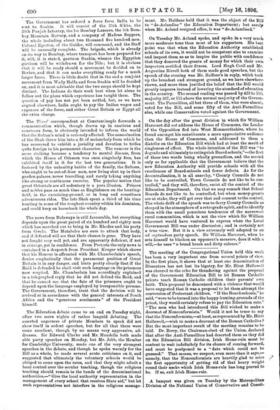On the day after the great division in which Sir
William Harcourt did not address the House of Commons, the Leader of the Opposition fled into West Monmouthshire, where he found amongst his constituents a more appreciative audience than the House of Commons, and addressed to them a diatribe on the Education Bill which had at least the merit of singleness of effect. The whole intention of the Bill was "to degrade and ultimately to extinguish Board-schools,"—the first of these two words being wholly groundless, and the second only so far applicable that the Government believe that the new Education Authority will provide schools with all the excellences of Board-schools and fewer defects. As for the decentralisation, it is all anarchy, " County Councils do not like to be controlled, Town Councils do not like to be con- trolled," and they will, therefore, resist all the control of the Education Department. On that we may remark that School Boards do not like to be controlled, but when money-grants are at stake, they will get over that and consent to the control. The whole drift of the speech was to decry County Councils as steeped in the atmosphere of a retrograde spirit, and to identify them with the small penurious tendencies of the narrowest rural communities, which is not the view which Sir William Harcourt would have ventured to express when the Local Government Bill was under discussion ; and is certainly not a true view. But it is a view extremely well adapted to an ad captandum party speech. Sir William Harcourt, when he sets himself to blacken an opponent's measure, does it with a will,—he uses " a broad brush and dirty colours."






































 Previous page
Previous page